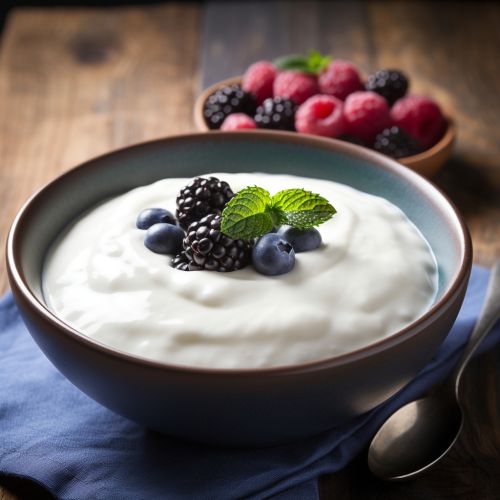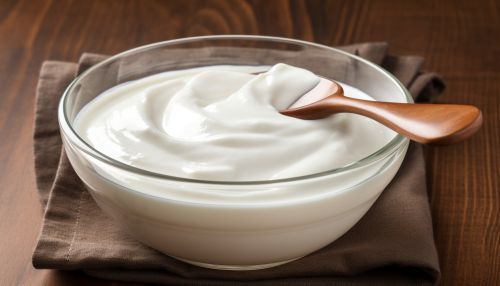Yogurt
Overview
Yogurt is a popular fermented milk product that is produced by bacterial fermentation of milk. The bacteria used to make yogurt are known as "yogurt cultures". These cultures ferment lactose, the natural sugar found in milk, to produce lactic acid. The lactic acid acts on milk protein to give yogurt its texture and its characteristic tang.


History
The history of yogurt is believed to date back to 5000 BC in the Neolithic period of Central Asia, where herdsmen discovered that fresh milk carried in leather pouches would occasionally ferment into a thickened product. The natural fermentation of the lactose in the milk by the lactic acid bacteria would result in a product that not only preserved the milk but also had a pleasant taste. This discovery, likely accidental, marked the beginning of yogurt. The word "yogurt" comes from Turkish and means "to curdle or coagulate".
Production
The production of yogurt involves a simple process that can be carried out at home. The process begins with the heating of milk to a temperature that kills any undesirable bacteria and denatures the milk proteins. This is followed by the cooling of the milk and the addition of a starter culture of lactic acid bacteria. The mixture is then kept at a warm temperature to allow the bacteria to grow and ferment the lactose in the milk, producing lactic acid. The acid causes the milk proteins to tangle into a solid mass, or curd. The curd is then strained and cooled, resulting in the final product of yogurt.
Types of Yogurt
There are many different types of yogurt, including set-style yogurt, stirred yogurt, concentrated yogurt, and probiotic yogurt. Set-style yogurt is made by pouring warm cultured milk into containers where it is left to ferment and set. Stirred yogurt is made by fermenting the milk in a large vat, stirring it to produce a creamy texture, and then pouring it into containers. Concentrated yogurt, such as Greek yogurt, is made by straining the yogurt to remove the whey, resulting in a thicker, creamier yogurt. Probiotic yogurt contains added probiotic bacteria that can provide health benefits.
Nutritional Value
Yogurt is a rich source of protein, calcium, vitamins, and minerals. It also contains live bacteria, known as probiotics, which can have beneficial effects on health. The nutritional value of yogurt can vary depending on the type of milk used in its production and the presence of any added ingredients.
Health Benefits
The consumption of yogurt has been associated with a range of health benefits. These include improved digestive health, bone health, and heart health. The probiotics in yogurt can help to maintain a healthy balance of bacteria in the gut, which can aid digestion and boost the immune system. The high calcium content of yogurt can also contribute to bone health. Some studies have also suggested that eating yogurt can help to maintain a healthy weight and reduce the risk of heart disease.
Cultural Significance
Yogurt has a significant cultural importance in many parts of the world. In some cultures, it is a staple food, while in others it is considered a delicacy. It is often used in cooking and baking, and it is a common ingredient in many traditional dishes.
